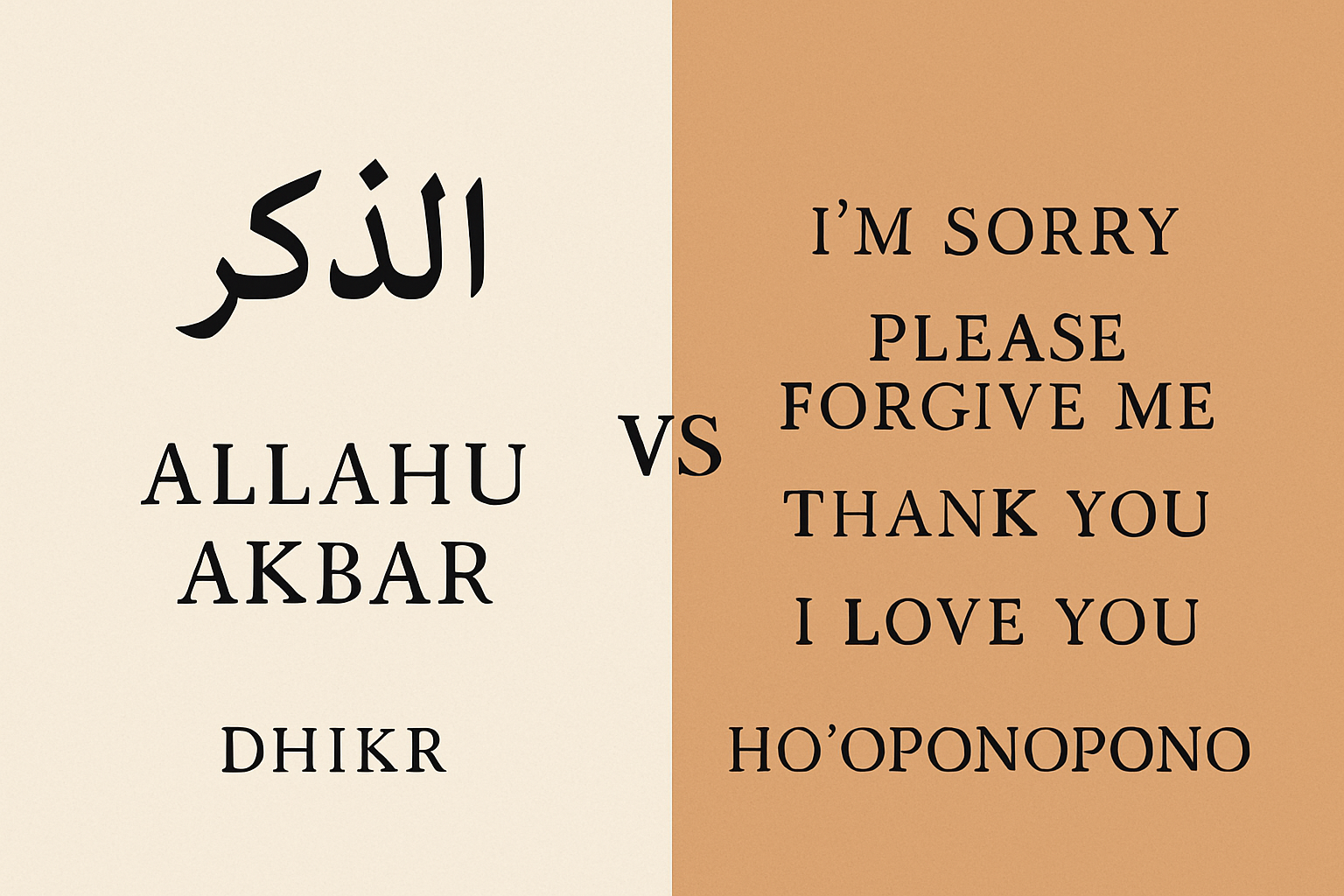By Muhammad Ali – Lahore, Pakistan
Introduction
In my spiritual journey and research across cultures, I came across a fascinating parallel between Islamic dhikr and the Hawaiian practice of Ho’oponopono. At first glance, both rely heavily on repetition, purification, and inner peace. But as I looked deeper, I realized that while they may appear similar in psychological effect, they are rooted in entirely different understandings of the Divine and the human soul.
This article explores these similarities and differences, especially through the lens of Islamic monotheism (Tawheed), where Allah (SWT) is beyond the universe and human imagination — a core distinction from many New Age or indigenous spiritual models.
What is Dhikr?

Dhikr literally means “remembrance” and refers to remembering Allah (SWT) through specific phrases, names, and supplications. After every obligatory prayer, Muslims are encouraged to recite:
- SubhanAllah (33 times) – Glory be to Allah
- Alhamdulillah (33 times) – All praise is for Allah
- Allahu Akbar (34 times) – Allah is the Greatest
In addition to these, a very important form of dhikr is Astaghfirullah – “I seek forgiveness from Allah.” The Prophet Muhammad (ﷺ) himself used to say Astaghfirullah over 70 times a day. It humbles us, reminds us of our limitations, and helps cleanse the heart from arrogance and heedlessness.
This repetition is not robotic; it’s meant to reconnect us with our Creator, align our hearts with His mercy, and purify our intentions in a world full of distractions.
What is Ho’oponopono?
Ho’oponopono is a Hawaiian practice for emotional healing and reconciliation. It involves repeating four main phrases:
- I’m sorry
- Please forgive me
- Thank you
- I love you
It is used to cleanse emotional blocks and restore harmony within oneself and with others. Some modern interpretations go further by teaching that you are healing your inner child or subconscious programming through this practice.
While there’s therapeutic value in it, it’s mostly internal and often sees the Divine as the “universe” or some all-connected energy rather than a personal, transcendent God.
Similarities: Repetition and Emotional Peace
Both dhikr and Ho’oponopono:
- Use repetition as a tool for transformation
- Bring calmness and reduce anxiety
- Foster self-awareness and emotional balance
- Aim to heal wounds — spiritual or emotional
The human heart responds to repetition. Whether it’s “Astaghfirullah” or “I love you,” repeated words create pathways in the mind and soul.
Key Difference: Who Are We Speaking To?
This is where the divergence becomes clear.
In dhikr, I know I am addressing Allah — the Creator of the heavens and the earth, who is not part of the universe but beyond it. He is unlike His creation, and He alone has the power to forgive, heal, and guide.
In Ho’oponopono, the repeated phrases are directed more toward oneself, or an inner Divinity, often interpreted as being part of the universe. While this might work psychologically, it’s theologically different from Islam. We don’t believe we are God, nor is God inside us in that way. Allah is above His creation, All-Knowing and All-Merciful, but separate from the universe.
The Role of Astaghfirullah
Adding Astaghfirullah to daily practice is immensely powerful. It’s not just about asking for forgiveness; it’s an acknowledgment of our need for Allah and a path back to Him.
It reminds me every day that I am flawed, but also that I am loved by a Lord who is ready to forgive as long as I turn to Him sincerely. It carries more meaning than “I’m sorry” because it’s said with the belief that Allah hears and responds.
Final Thoughts
While Ho’oponopono may offer emotional healing through positive affirmations, dhikr offers something more profound — a direct connection to Allah (SWT). It’s a conversation with the Creator, a form of worship, and a ladder to spiritual elevation.
The main difference lies in who we believe is listening. Ho’oponopono speaks to the self or a universal energy. Dhikr speaks to the One who created the universe.
This is why after every salah, we are taught to remember Allah multiple times — 33, 99, or even more — because repetition strengthens connection, but only if directed toward the Truth.
“Astaghfirullah Rabbi Min Kulli Dhambin Wa Atoobu Ilayh”
(I seek forgiveness from my Lord for every sin and I turn to Him in repentance.)

